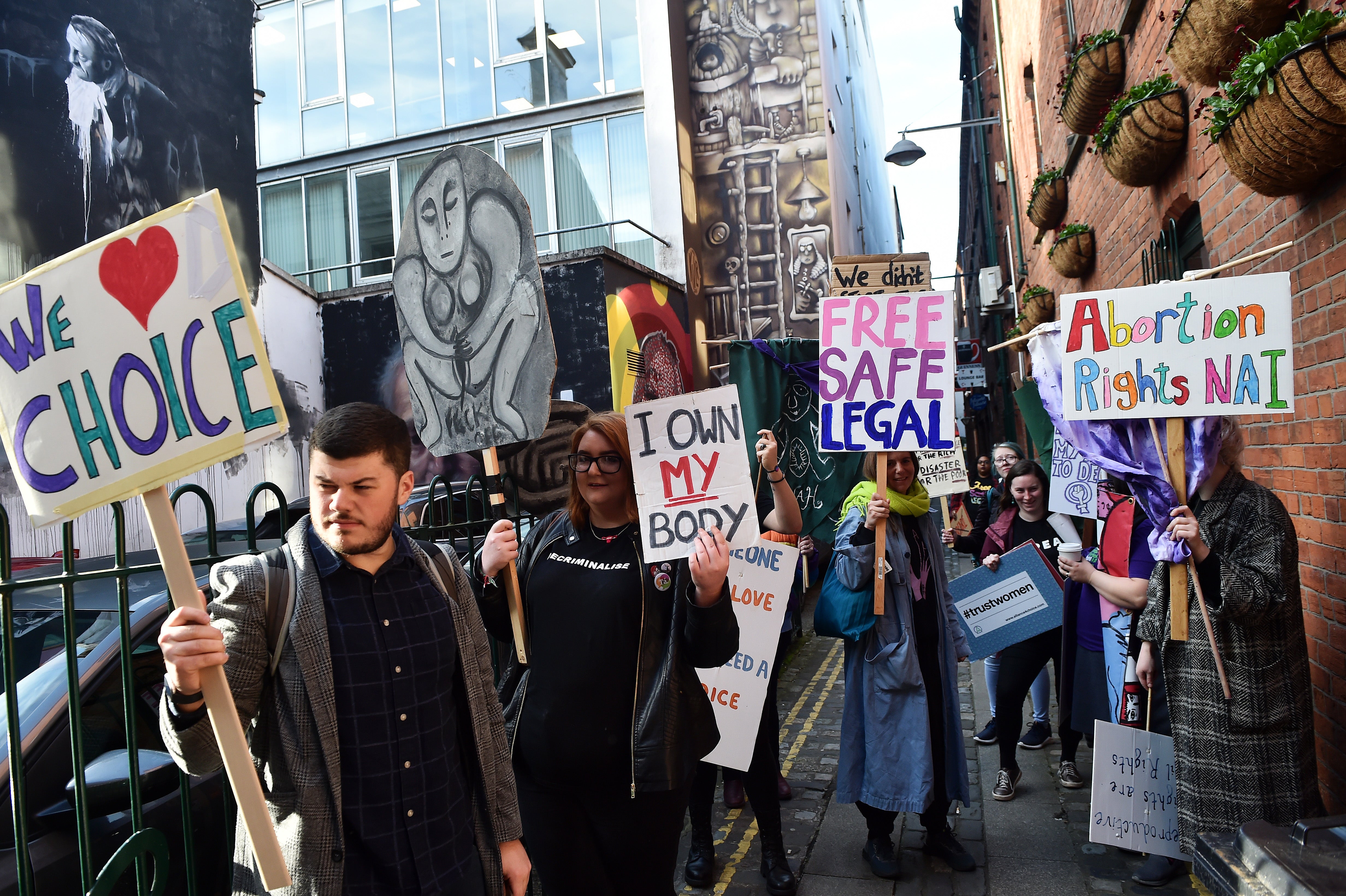Inside the chaos of Northern Ireland’s failure to roll out abortion services despite decriminalisation
Exclusive: Healthcare providers tell Maya Oppenheim women are routinely struggling to get abortions


Your support helps us to tell the story
From reproductive rights to climate change to Big Tech, The Independent is on the ground when the story is developing. Whether it's investigating the financials of Elon Musk's pro-Trump PAC or producing our latest documentary, 'The A Word', which shines a light on the American women fighting for reproductive rights, we know how important it is to parse out the facts from the messaging.
At such a critical moment in US history, we need reporters on the ground. Your donation allows us to keep sending journalists to speak to both sides of the story.
The Independent is trusted by Americans across the entire political spectrum. And unlike many other quality news outlets, we choose not to lock Americans out of our reporting and analysis with paywalls. We believe quality journalism should be available to everyone, paid for by those who can afford it.
Your support makes all the difference.Until 2019, Northern Ireland had some of the most uncompromising abortion laws in the entire world – despite the medical procedure being legal in the rest of the United Kingdowm since 1967.
Having a termination was forbidden in almost all circumstances, even if the pregnancy was the result of rape or incest, and women faced life imprisonment for seeking the procedure.
But while abortion may have been made legal in Northern Ireland over two-and-a-half years ago, getting a pregnancy terminated is still by no means a straightforward process. On the contrary, the government has failed to roll out services, say campaigners. The few abortion providers in place are being run by those in the voluntary sector, and are massively overstretched, they say.
The situation is so “chaotic” Northern Ireland’s Human Rights Commission has launched a landmark legal challenge against the Northern Ireland Executive and the UK government over the heavily protracted failure to commission abortion services. In their view, the delay infringes women and girls’ human rights.
Healthcare providers tell The Independent women in Northern Ireland are routinely struggling to get the abortions they are now legally entitled to and many are calling services in floods of tears due to confusion about how they access terminations.
Exclusive data from leading abortion provider MSI Reproductive Choices shows they have provided abortions to 29 women who travelled from Northern Ireland to England from May 2020 to May this year. But the true figure will be substantially higher as this is solely one abortion service.
“Women in need of abortion are still being abandoned by the state,” Emma Campbell, co-chair of Alliance for Choice, a leading campaign group for abortion rights in Northern Ireland, tells The Independent. “There is a lot of confusion when people call us.”
Ms Campbell, who has worked in abortion rights in Northern Ireland for a decade, said around seven in ten of their calls come from people who are totally clueless about how they get an abortion in Northern Ireland.
She warned there is no information whatsoever about abortion services on government websites and people must instead go on their organisation’s site or that run by another charity called Informing Choices.
“We’re forcing people to be detectives to find out about their abortion service,” Ms Campbell adds. “It should be so easy. Essentially the Democratic Unionist Party (DUP) are blocking services because they’re anti-abortion.”
She said five sexual health clinics which also provide abortions were opened “against the wishes” of the Department of Health but they have had no funding whatsoever and are instead being run by non-government organisations.
“It is really precarious if someone goes on maternity leave or is ill, nobody is left,” Ms Campbell adds. “If you google abortion in Northern Ireland, the first place that comes up is Stanton Clinic which is anti-abortion. They are on the same property as Precious Life, a leading anti-abortion charity in Northern Ireland.”
She said when women seek support from Stanton Clinic, a pregnancy clinic established by American anti-abortion activists, their abortion service is “deliberately delayed” so they are further along in their pregnancy. While abortion is decriminalised in Northern Ireland, it is only permitted up to 12 weeks, unlike the rest of the UK where abortion is legal for the first 24 weeks of pregnancy.
“They are sent for unnecessary scans,” Ms Campbell claims. “They try and convince them to not have an abortion and threaten them saying we have your mobile number, we know where you live, we will tell your neighbours you are having an abortion. There is still a huge stigma attached to abortion.”
She said one woman in her 20s called in tears saying the Stanton Clinic had treated her “appallingly”, so Alliance for Choice managed to get her an appointment at an abortion clinic in Belfast. However, they were forced to warn the woman that people might be protesting outside the clinic they were sending her to.
Women in need of abortion are still being abandoned by the state
“She was in floods of tears,” Ms Campbell adds. “She was terrified. There was another woman who couldn’t go to an abortion clinic as all of her partner’s relatives were in the protest outside.”
The campaigner fiercely criticised the fact people in Northern Ireland were still being forced to have abortions in England – adding that it is especially troubling when people are made to put their health at risk by travelling at the height of the pandemic and exposing themselves to Covid.
”It is embarrassing and a complete failure of governance,” Ms Campbell reflects. “It makes me feel frustrated and angry. We hoped by May 2021 we would be working to normalise abortion not pushing for actual services to be created.”
Abortions later on in the pregnancy in Northern Ireland are permitted if there are severe or fatal abnormalities or the mother’s health is placed at risk by the pregnancy.
Brandon Lewis, the Secretary of State for Northern Ireland, has indicated he will instruct Stormont to roll out abortion services if no action is taken by the summer.
Fiona Bloomer, a senior lecturer at Ulster University who specialises in abortion policy, said there is a service providing abortions in the Western Health Trust in Northern Ireland that is massively struggling.
“Everything is delivered by one doctor, she is taking referrals, doing the initial telephone and then specific treatment when they come into the clinic, and all monitoring forms,” Ms Bloomer adds. “She has said she is not prepared to go on in the role until she gets adequate support.”
The academic noted women and pregnant people seeking abortions from that particular service will either have to order an early at-home medical abortion online or travel to England to have an abortion. This is because other trusts in Northern Ireland do not have the capacity to take on extra patients, she warned.
“Women and pregnant people are suffering because of this,” she adds. “And healthcare providers are under stress because they are under-resourced. It is an absolute disgrace. We have very committed health professionals willing to deliver services but they hampered by a lack of commissioning.”
Louise McCudden, of leading UK abortion provider MSI Reproductive Choices, said abortion in Northern Ireland often continues to be shrouded by stigma and shame.
“Women having abortions in England sometimes lie about what they are coming to do,” she adds. “They sometimes go to local department stores to make sure they can buy shopping bags. Sometimes they are having to keep it a secret from people they live with or from colleagues or friends or family.”
She hit out at the fact women in Northern Ireland were sometimes still not able to access abortion due to services still not being properly “up and running”.
“Commissioning is not happening because of political and ideological barriers,” Ms McCudden adds. “It is disgraceful. Especially in a global pandemic when it is hard to travel.”
A spokesperson for Stanton Clinic has been contacted for comment.
If you are based in Northern Ireland and have been affected by the issues raised in this story, you can speak to someone in confidence at the Abortion Support Network by calling 07897 611593 or emailing info@asn.org.uk or you can ring MSI Reproductive Choices on 0333 234 2184.
Subscribe to Independent Premium to bookmark this article
Want to bookmark your favourite articles and stories to read or reference later? Start your Independent Premium subscription today.


Join our commenting forum
Join thought-provoking conversations, follow other Independent readers and see their replies
Comments